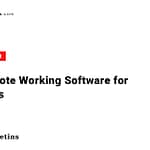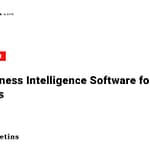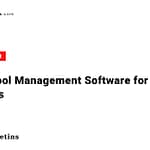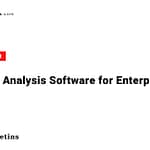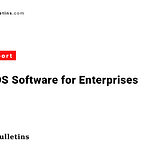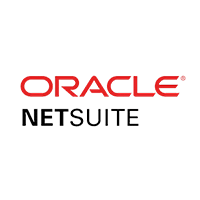Introduction
Efficiency is the key to growth for small and medium-sized enterprises (SMBs). Managing finances, sales, inventory, customer relationships, and supply chains gets harder as a business grows. Enterprise Resource Planning (ERP) software fills in this gap by giving businesses a single platform that makes processes easier and brings all of their operations together. But there are so many ERP solutions on the market that it might be hard to pick the correct one. For small and medium-sized businesses (SMBs), the selection is even more important since they frequently have less resources than large businesses. Factors including simplicity of use, scalability, cost, and customer service all play a role.
This in-depth study looks at the five best ERP systems for small and medium-sized businesses (SMBs) and helps decision-makers figure out which software is ideal for their specific needs.
Methodology
We used a six-parameter benchmark system to make sure that the ERP solutions in this post are a clear, useful, and fair evaluation for SMBs.
- Ease of Use — How easy it is for employees with different levels of technical competence to utilize the program.
- Core Features — The different tools that the program has to do important SMB tasks.
- Integration Capabilities — The capacity to work well with third-party apps and business processes that are already in place.
- Scalability — How effectively the software can grow with a firm as its demands and processes change.
- Pricing — How affordable and flexible the different pricing tiers are for small and medium-sized businesses.
- Customer Feedback — What real users say about how reliable, helpful, and happy they are with the product.
Top 5 ERP Software for SMBs
1. Oracle NetSuite
Overview: Oracle NetSuite is one of the most complete cloud-based ERP systems. It helps small and medium-sized businesses (SMBs) handle their finances, customer relationship management (CRM), e-commerce, and more from one place. It’s especially good for SMBs that want to develop quickly and do business throughout the world while still following the rules and reporting requirements.
Key Features:
- Unified financial management and reporting
- Advanced supply chain and inventory monitoring
- E-commerce integration for online-first firms
- Real-time analytics and dashboards
- Good support for several currencies and languages
Benchmark Performance:
- Ease of Use: Good — there’s a slight learning curve, but it’s easy to use once you get the hang of it.
- Data Integration: Excellent — there are many ways to connect with apps and APIs.
- Visualization: Strong — detailed, customizable dashboards.
- Scalability: Outstanding — ideal for businesses that are growing and want to expand globally.
- Pricing:
- Free Plan: Not available
- Starter: Custom price (usually approximately $99/user/month)
- Professional: Custom pricing depending on modules
- Enterprise: Fully customized, quote-based
- Free Trial: Yes
- Customer Reviews:
- Average Rating: 4.3/5
- Pros: Great financial tools and a lot of room for growth
- Cons: Prices can be high for very small enterprises
- Customer Quote: “NetSuite had everything we needed in one place, but we had to spend time on onboarding because it was so deep.”
2. SAP Business One
Overview: SAP Business One is intended for small and medium-sized businesses who want the capabilities of an enterprise-level ERP system but don’t want it to be too complicated. It contains strong modules for finance, sales, and purchasing, as well as powerful reporting tools. Great for SMBs that make, sell, or distribute products.
Key Features:
- Comprehensive financial management
- Inventory and warehouse management
- Detailed reporting and analytics
- A built-in CRM module
- Templates for manufacturing and retail that are relevant to the industry
Benchmark Performance:
- Ease of Use: Moderate — needs some training.
- Data Integration: Strong — works with SAP HANA and other apps.
- Visualization: Excellent — attractive dashboards.
- Scalability: High — grows with mid-sized organizations well.
- Pricing:
- Free Plan: Not available
- Starter: About $94 per user per month
- Professional: Usually more than starter, based on license
- Enterprise: Custom estimates for bigger SMBs
- Free Trial: Yes
- Customer Reviews:
- Average Rating: 4.2/5
- Pros: Strong analytics, works well for industrial companies
- Cons: Setting it up can be hard
- Customer Quote: “After we set it up, SAP Business One became the main part of our daily work.”
3. Odoo ERP
Overview: Odoo ERP is a modular, open-source ERP system that SMBs adopt for its affordability. Because it is flexible, businesses may pick and choose the applications they need, which makes it economical and easy to change. Perfect for small firms who want to use ERP without spending a lot of money.
Key Features:
- Modular design includes applications for CRM, sales, HR, and accounting
- Open-source flexibility for modification
- Easy-to-use web-based user interface
- Workflow automation across departments
- Available in both Community and Enterprise editions
Benchmark Performance:
- Ease of Use: High — the interface is simple and modern.
- Data Integration: Good — APIs are accessible, but more complex integrations may need customization.
- Visualization: Moderate — standard dashboards with opportunities for customization.
- Scalability: Strong — it scales with app-based growth.
- Pricing:
- Free Plan: Yes (Community Edition)
- Starter: $24.90/user/month (Enterprise Edition)
- Professional: Additional modules charged individually
- Enterprise: Fully customizable
- Free Trial: Yes
- Customer Reviews:
- Average Rating: 4.0/5
- Pros: Affordable, extremely configurable
- Cons: Advanced functions may need technical skill
- Customer Quote: “Odoo gave us freedom without costing a lot of money, but it took a while to make changes.”
4. Microsoft Dynamics 365
Overview: Microsoft Dynamics 365 is an intelligent platform that integrates ERP and CRM. It is supported by the Microsoft ecosystem. Best for SMBs that use Microsoft Office a lot and wish to connect Azure, Teams, and Power BI in a strong way.
Key Features:
- A single system for CRM and ERP
- Built-in AI insights and forecasts
- Works perfectly with Microsoft applications
- Scalable modules for finance, HR, and operations
- Strong data security with Microsoft cloud
Benchmark Performance:
- Ease of Use: Strong — Microsoft users will find the UI familiar.
- Data Integration: Outstanding — works well with Office 365 and third-party apps.
- Visualization: Excellent — advanced Power BI reports.
- Scalability: High — easily scales with add-ons and modules.
- Pricing:
- Free Plan: Not available
- Starter: $65 per user per month
- Professional: $95 per user per month
- Enterprise: Custom pricing for big SMBs
- Free Trial: Yes
- Customer Reviews:
- Average Rating: 4.4/5
- Pros: Works very well with Microsoft products
- Cons: Hard to set up for people who have never used an ERP before
- Customer Quote: “Dynamics 365 made our workflows easier, but the setup was harder than we thought it would be.”
5. Zoho ERP
Overview: Zoho ERP is part of the Zoho One package and is meant for small and medium-sized businesses that need a simple, affordable ERP system with good CRM, HR, and financial functions. It works especially effectively for SMBs that provide services or are focused on sales.
Key Features:
- One suite for CRM, HR, finance, and inventory
- Cloud-based and accessible via mobile devices
- Simple interface for non-technical workers
- Works with more than 40 Zoho apps and third-party software
- An affordable all-in-one bundle for SMBs
Benchmark Performance:
- Ease of Use: Excellent — very easy to use.
- Data Integration: Strong — works best in the Zoho ecosystem.
- Visualization: Good — standard dashboards with customization.
- Scalability: Moderate — best for small to mid-sized businesses.
- Pricing:
- Free Plan: Limited free version available
- Starter: $45 per user per month
- Professional: $105 per user per month (Zoho One complete suite)
- Enterprise: Custom price
- Free Trial: Yes
- Customer Reviews:
- Average Rating: 4.1/5
- Pros: Cheap and easy to use
- Cons: Not as scalable as major ERP suppliers
- Customer Quote: “Zoho ERP was easy to set up and met our sales needs, but we may need to move to a bigger system if we want to grow.”
Comparative Analysis Table
| Software | Ease of Use | Data Integration | Visualization | Scalability | Starting Price |
|---|---|---|---|---|---|
| Oracle NetSuite | Good | Excellent | Strong | Outstanding | ~$99/user/month |
| SAP Business One | Moderate | Strong | Excellent | High | ~$94/user/month |
| Odoo ERP | High | Good | Moderate | Strong | Free (Community) |
| Microsoft Dynamics 365 | Strong | Outstanding | Excellent | High | $65/user/month |
| Zoho ERP | Excellent | Strong | Good | Moderate | $45/user/month |
Recommendations for SMBs
- Small businesses on a budget: Odoo ERP or Zoho ERP are great options because they are affordable and provide all the capabilities you need.
- Sales-Focused SMBs: Zoho ERP is the best choice for SMBs that want to improve their sales and customer relationship management.
- Manufacturing and Distribution SMBs: SAP Business One has templates made just for these kinds of businesses.
- Fast-Growing Global SMBs: Oracle NetSuite gives you the tools you need to grow your business throughout the world.
- Microsoft-Centric SMBs: Microsoft Dynamics 365 is excellent for firms that currently use Office 365, Teams, or Power BI.
Conclusion
For small and medium-sized businesses (SMBs) who want to stay competitive in today’s fast-paced business world, ERP software is no longer a choice; it’s a must-have. The ideal ERP decision for each SMB relies on their particular goals, budget, and growth path. There are options for every budget, from economical modular platforms like Odoo ERP to worldwide enterprise-grade systems like Oracle NetSuite.
Zoho ERP is an easy-to-use and affordable solution for small businesses. SAP Business One and Microsoft Dynamics 365 are great for growing operations since they include industry-ready modules and good performance. Businesses that want to grow globally may count on Oracle NetSuite for its superior features and ability to grow with them.
In the end, SMBs should choose an ERP system that fits with their long-term goals and makes sure it can grow with them.
References
- Top review platforms: G2, Capterra, TrustRadius
- Vendor websites: Oracle NetSuite, SAP Business One (SAP), Odoo, Microsoft Dynamics 365 (Microsoft), Zoho One (Zoho)
- Industry reports: Gartner, Forrester Research, IDC.



